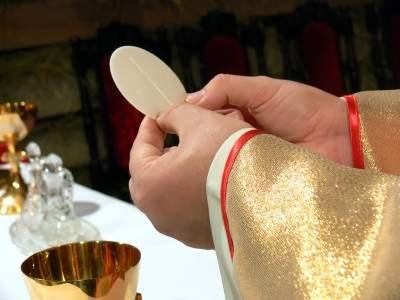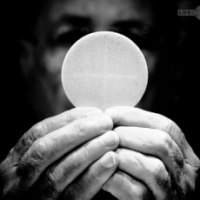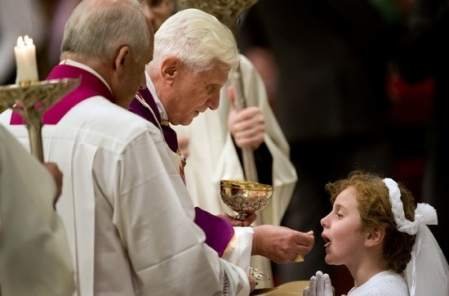 Today I’m troubled by the first major challenge from my parents to the Catholic Church: not so much, thankfully, to my personal journey, but ostensibly to the Catholic practice of closed communion.
Today I’m troubled by the first major challenge from my parents to the Catholic Church: not so much, thankfully, to my personal journey, but ostensibly to the Catholic practice of closed communion.
My father feels offended to be excluded from the Catholic Eucharist. As a baptized Christian, he feels he is privileged to partake. He feels that in denying him communion, the Church is in effect saying he is not a Christian. He feels that the practice of closed communion perpetuates division in the Body of Christ. My mother is hurt that she could not come to my church and take communion with me, or I with her at her church.
Frankly, I had no expectation that this would be an issue. It had not even occurred to me that this would be upsetting to anyone until I googled and found that many Protestants were troubled by this matter. From the very first time I attended Mass some seven years ago, then a thoroughgoing Protestant, it seemed perfectly natural and reasonable to me for the Catholic Church to exclude non-Catholics from the Eucharist. I recognized, even then, that the Church held the Eucharist to be most sacred, was very protective of it, and didn’t offer it to just anybody.
Further study revealed that closed communion is nothing new; it’s one of the most ancient customs of the Church:
But let no one eat or drink of your Eucharist, but they who have been baptized into the name of the Lord; for concerning this also the Lord has said, “Give not that which is holy to the dogs” (Didache 9, ca. mid to late first century A.D.).
We call this food Eucharist, and no one else is permitted to partake of it, except one who believes our teaching to be true and who has been washed in the washing which is for the remission of sins and for regeneration and is thereby living as Christ has rejoined (St. Justin Martyr, First Apology 65, ca. A.D. 150.).
So the Eucharist was closed to non-Christians; it was only open to baptized Christians who believed the truth of catholic teaching. Certainly, in those early days, when Christianity was outlawed and persecuted, an unknown stranger could not have simply shown up at a Christian meeting, professed to be a baptized Christian, and been received into the Mysteries; no, he would have to have been a known, accepted, and approved member of that community, or else commended to it by other known, accepted, and approved Christians. The Eucharist was closed for the Church’s protection. The unbaptized were not even allowed to be present at the Eucharist, let alone to receive it.
What says, then, that communion should be open? My dad points out that there is nothing in Scripture that says explicitly that communion should be closed; but likewise there is nothing in Scripture that says that it should be open to all without restriction. St. Paul, in 1 Corinthians, is writing to the church at Corinth, a closed communion of Christian believers. He does not recommend that the church open its doors and its table to strangers from the street; he is advising the church in the context of its own private, closed Eucharistic celebration. The Eucharist, the Communion of believers with Christ and with each other, is the most intimate and precious of all the Christian Mysteries. It was closely protected and guarded.
But this is 2012. There is no longer the need for such protection, is there? The liturgy of the Mass is no longer a closely-guarded secret; there are no longer accusations of cannibalism in Christians consuming the Lord’s Body and Blood; there are no longer persecutions unto death in our country. My parents are both baptized Christians. Shouldn’t they, known, accepted, and approved Christians, be allowed to receive the Eucharist, too?
That depends on what you believe the Eucharist to be. Evangelical Protestant communities that practice open communion by and large believe that the Lord’s Supper is merely symbolic, a memorial gesture of communion with the Lord, with no sacramental value. When I questioned my dad, this is basically what he affirmed. Christ extends the offer of grace and salvation to all; so why wouldn’t communion in His Body and Blood be extended to all? This exclusivity, this seeming denial of grace to the uninitiated, is what offends my dad.
 But if you believe, as the Catholic Church believes, that the Eucharist is a real, actual, physical communion, in body and spirit, with the Body and Blood of Jesus Christ, a sacramental commingling of our elements with His Elements, then it seems to me that you would have no choice but to be protective of that communion, and selective of who partakes in it. The Early Church allowed only those who believed and affirmed the reality of that Holy Communion. Why would the modern Church allow anyone who denies that reality? Should the Church offer the most intimate communion with our Lord to just anyone who walks in off the street, who doesn’t even have faith in Him? You may be a Christian — and the Catholic Church affirms that, if you have been baptized in the name of the Father, Son, and Holy Spirit, you have a right to be called Christian (Unitatis Redintegratio I.3 § 1) — but if you deny His Real Presence in the Eucharist, it is you who are denying yourself full communion.
But if you believe, as the Catholic Church believes, that the Eucharist is a real, actual, physical communion, in body and spirit, with the Body and Blood of Jesus Christ, a sacramental commingling of our elements with His Elements, then it seems to me that you would have no choice but to be protective of that communion, and selective of who partakes in it. The Early Church allowed only those who believed and affirmed the reality of that Holy Communion. Why would the modern Church allow anyone who denies that reality? Should the Church offer the most intimate communion with our Lord to just anyone who walks in off the street, who doesn’t even have faith in Him? You may be a Christian — and the Catholic Church affirms that, if you have been baptized in the name of the Father, Son, and Holy Spirit, you have a right to be called Christian (Unitatis Redintegratio I.3 § 1) — but if you deny His Real Presence in the Eucharist, it is you who are denying yourself full communion.
If you don’t share the Catholic belief in the Real Presence, why would you be offended at the closed communion? I think that is why it has never offended me: I recognized and respected that I believed differently. I think what offends my dad is the thought that since Christ’s death on the Cross was freely offered to all, why should participation in His Communion be offered to only a select few? This perception of exclusivity is in fact false. The Church has never excluded anyone from grace who sought it. She welcomes all Christians into full, Eucharistic Communion. But they must first affirm what she teaches: the reality of Christ’s presence in that Communion. What “perpetuates division” is Protestants’ continued denial of this core Catholic truth, the “source and summit of our faith.”
I think what offends my dad, even more fundamentally, is the idea that the Church has authority at all: the authority to tell anyone that they cannot celebrate the Eucharist when, where, and exactly how they wish. In the democratic and individualistic mindset that has ascended in modern evangelicalism, any individual is free to approach Christ outside and without the Church at all. It’s a misguided interpretation of the “priesthood of all believers,” taken to its furthest extreme: each believer individually is his own priest, and therefore needs no one else at all. And this gets into a whole ‘nother barrel of worms that I’ll have to deal with another time.
Suffice it to say that I am troubled. This will not stop the course I know I have been placed on; but I don’t want my parents to be offended or hurt. I don’t want them to feel excluded or rejected. But I’ve talked to my dad at length, and I don’t think there’s any getting past this; he’s unwilling to see the matter any other way.


“Closed communion”… Closed communion is such a strange (to me) phrase and idea, now. Communion is BY DEFINITION something “closed,” if communion is a fellowship between distinct persons (God, me, and the other members of the Church). Communion is, in its deepest biblical and apostolic origins, the boundary marker of the Church, and it signifies what it also effects: communion with God through His Body the Church.
But I grew up evangelical where “closed communion” was such a foreign thing I didn’t understand what it actually meant — and still I think closed communion as practiced by many Protestants is very different than closed communion practiced by Catholics. It calls to mind a small, maybe cramped community gathered around some personality-leader who knows each individual well enough to know whether they are a “true believer.” I think that negative connotation comes down from the Puritans and, in general, the Great Awakening-track American spiritual traditions, although I’m spitballing because I haven’t actually researched closed communion among Protestants. For Catholics, like you point out, it was always true that communion was “closed” to baptized believers in good standing with their conscience and with the Church (re: Paul who pretty much totally says this!). There were centuries where excommunication for public sins was a real and serious punishment that people cared about. Closed communion is essentially a discipline of the Church, which is, yes, EXACTLY why evangelicals don’t like it. 🙂 But this isn’t to say that it is exactly enforced for Catholics (which is sort of good, sort of bad). I’m glad that, when I go to Mass in some random church, the priest doesn’t give me the eye just because I’m not recognizable. (The idea of this happening in Mass is actually CRAZY. The Church has a much less clannish feel, in a way, than almost any Protestant church you might walk into.) And I’m glad that communion is no longer as “protected” as it was not too long ago, when few people communed at regular Masses, but instead received it outside of its liturgical setting when they finished in the confessional in Advent or Lent. On the other hand, if we take seriously Paul’s injunction that receiving the sacrament unworthily damns us (!), and that it’s primarily the priest’s job to ensure that no one intentionally dishonors the sacrament, then I can see why some people would like a bit more oversight than there is now. Yet I think that this gap can be closed with more preaching about confession, more frequent opportunities for confession (and more frequent confession by parishioners), and a livelier culture of spiritual direction. Because the idea isn’t just to make sure Jesus is “protected” (although it’s important that we show him honor and worship in the sacrament, he humbles himself and puts himself at our mercy knowing who we are — less frequent reception to make sure we are in some “intensely pure” state is not the point), it’s to grow in holiness.
You’re exactly right that it’s a misapplication of the priesthood of all believers, and in the same way it’s a misunderstanding of the nature of the Church. More and more I come back to this (simple, so obvious) realization that what evangelicals have wrong (or more to the point, don’t have at all) is ecclesiology. They are so afraid of predicating anything about the Church (anything that would be *real* and *livable*, anything that would be “visible” and human) that they would rather just go without it. (Particularly because their reading of the New Testament seems to make this rather easy.) That sounds like a sweeping statement in the face of all the “new” ecclesiology going on in post-evangelical circles, but I honestly think that as long as their ecclesial communities remain built (theologically) on the foundation of personal and spontaneous auto-authority, their ideas won’t take root. And this is sad, because some of them are writing beautiful and true things about “the church” (as they always call it, referring to some amorphous blob of “Christianity in the world.”) Bryan (on Called to Communion) calls this a gnostic ecclesiology because it denies the humanity of the Church, and so by implication denies the humanity of Christ. I certainly hold that evangelicals are gnostic in their belief about the Eucharist (in that they hold beliefs that gnostic Christians EXPLICITLY HELD), and I’ve been convinced of that since I read a book arguing this written by a Presbyterian. So this can be extended to the Church. But evangelicals actually say less about “the church” than they say about communion, so it’d be hard to really press that charge. What I actually think is that they are ecclesiological agnostics. It is a dangerous and lonely thing to be.
P.S. Of course, “you are just ecclesiological agnostics!” is not the thing to say to parents who are feeling rejected. Hahaha. (I know this because it is the tactic I have often taken with my father, and it does not accomplish anything you might want to accomplish.) I would just explain that it is a part of the pastoral role of the Church (or a church), and a very important sign of a deep communion which goes beyond baptism. Then talk up how Catholics really do see baptism as the principle of unity between Christians, even if we are not all yet in perfect, communing unity. It is kind of weird, isn’t it, that the visible sign of disunion is resented, and not the actual disunion — although they don’t see it as disunion. But how can it not be a disunion when we actually believe different things about what communion actually is?? Anyway.
I try to be sensitive to it when Protestants are hurt or feel like they are scoffed at by Catholics, even if the Catholics are just stating the facts as they see them in love. But I also remember that it’s precisely that uncomfortable, unpleasant hurt and feeling of rejection that kept me wondering about the Catholic Church and eventually made me need to reconcile myself to her. And when I was an evangelical, I also had a lot of presumption I needed to get over. Spiritual envy runs rampant in certain strains of evangelicalism — we just hate when anyone claims to be better than we are (see also: Mary and the saints). As Catholics we should NEVER make people feel like we are personally rejecting them (of course we aren’t… we were exactly like them not long ago), but disunity among Christians is SUPPOSED to feel crappy. It is crappy. It is not God’s fullest intention for us. It is not just a given.
I guess I’ve never thought of the closed Communion practice as a “protective” measure, but something that is tied to the Eucharist itself. In order to receive the true presence, you must believe it *is* the real presence, or else you are attempting to partake of something that you do not truly believe. I would not attempt to enter into a Protestant church and expect to be received into their practices, because I do not adhere to all the tenets of their faith. When one partakes in the Eucharist, they are saying “yes, I do believe in the true presence and in all that the Church believes to be true.” How can there be fullness of Communion with the church and all its members, including the Communion of Saints, if one doesn’t affirm this?
Side note, it really bothers me that many Catholics themselves don’t understand or believe in the true presence. Unfortunately many only think we have a symbolic Communion as Protestants do. This is one thing that I think is most divisive between Catholics and Protestants, that we believe the hosts consecrated at Mass are *actually the body and blood of Christ*, whereas even we see Communion in most other churches (all those without apostolic succession), as no more than a symbol, regardless of their own beliefs. The ordination of our priests going back in a line all the way back to Peter, who was ordained by Christ himself, gives Priests the ability to consecrate the hosts and wine, and although others (some branches of Lutherans for example) may believe to have the real presence, they lack the apostolic succession that the Church has had since its beginnings.